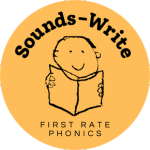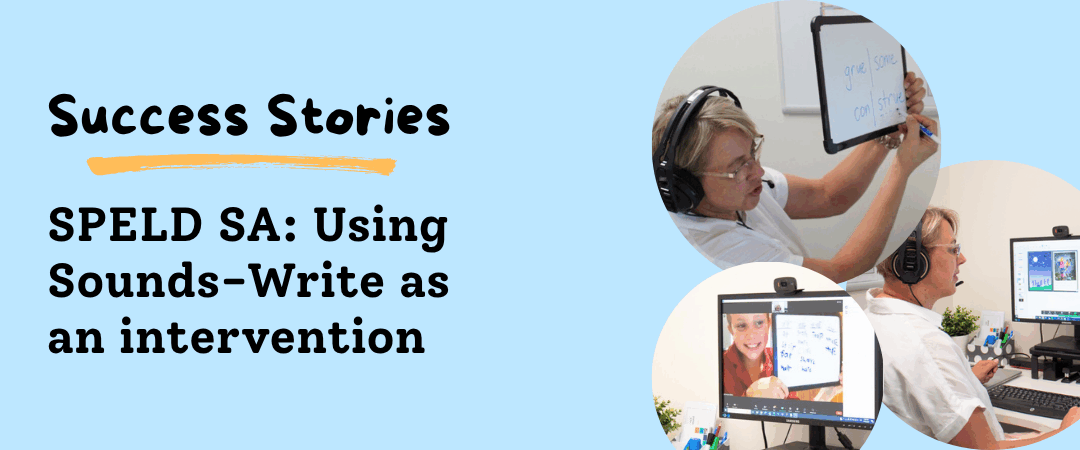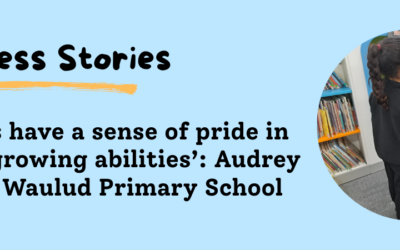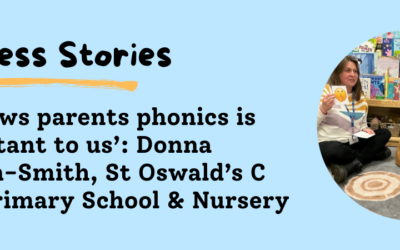SPELD SA (Specific Learning Difficulties South Australia) is a not-for-profit organisation based in Adelaide, that provides literacy interventions as part of ‘advice and services for children and adults with specific learning difficulties and those who care for, teach and work with them’. Ilona Sydney-Jones, SPELD SA Educational Consultant and Accredited Sounds-Write Trainer, talked to us about how the team uses Sounds-Write to teach reading and spelling online.
Why are some clients opting for online tutoring and what are the advantages?
Families who have chosen online tutoring are those who are geographically isolated, or who live in another state in Australia. Providing Sounds-Write online means that they can access a skilled practitioner and an effective intervention program for reading and spelling instruction from the comfort of their own homes. Some students also opt for online tutoring if travel disrupts their schooling or the families are time poor, and they are old enough to do their sessions online from school or home.
You can deliver Sounds-Write online in an engaging and interactive way, and the scripts and resources become familiar and predictable.

We taught a home-schooled Year 4 student who travelled around Australia for a year with her family whilst still attending weekly online Sounds-Write sessions, and she made steady progress. The family chose to go paperless whilst travelling, so the student used a whiteboard and marker for her lessons as well as the online free SPELD SA decodable books.
Ilona Sydney – Jones, SPELD SA
How easy is it to use Sounds-Write for online tutoring?
With the online interactive whiteboard activities from the Portal, practitioners can plan for individual students’ needs with ease. Even though the activities are set up, the practitioners can include some adaptations, for example, they might want to create slides to embed different interactive games as well as incorporate activities with previous code for revision.
Prior to their 12-week online blocks of sessions, practitioners set up a homework schedule and packs of decodable readers and home learning materials to accompany their sessions so they can be sent to the student. These Sounds-Write resources are invaluable to support the delivery of tutoring online.
How easily do clients adapt to online tutoring?
Due to the lessons being set up so well, it’s a seamless transition between face-to-face and online sessions. We’ve had students who were unable to attend the clinic in person and, when offered an online session, they were able to easily run with the program. It provides flexibility and helps with keeping the students’ weekly attendance consistent.
The practitioner and the student can still make use of a mini whiteboard and marker pen as in face-to-face sessions (as illustrated below by Ilona and her student during an online session).
Do you have any advice for those considering online tutoring?
- If possible, meet the student to build the rapport prior to commencing online sessions and to get an idea of handwriting, and their spelling and reading abilities.
- Setting up good routines is vital to ensure the sessions are efficient and something to be discussed at the start with the parent/caregiver, either face-to-face or online.
- The interactive whiteboard activities from the Practitioners’ Portal make it very accessible to run online Sounds-Write sessions.
- If you are considering online tutoring using Sounds-Write, you will also need to familiarise yourself with the online decodable books as they’re the books you’ll be sharing.
- Continual communication between practitioner and family is important, even just an email at the end of the session to touch base on the student’s progress and any homework expectations.
You may also like
‘Pupils have a sense of pride in their growing abilities’: Audrey Duffy, Waulud Primary School
Audrey Duffy, Phonics Lead at this two-form entry school in Luton, explains how careful planning and the rigorous training of all staff has delivered solid results, and led to obtaining Silver accreditation in recognition of the school’s commitment to high quality...
Phonics Screening Check – Tips for a Strong Start to the Academic Year (Australia)
Whilst the timing of this blog was prompted by the start of the new academic year in Australia, the guidance will be useful to teachers using a Phonics Screening Check anywhere around the world. In fact, we shared a VERY similar post back in September for the start of...
‘It shows parents phonics is important to us’: Donna Wilson-Smith, St Oswald’s C of E Primary School & Nursery
Donna Wilson-Smith, Headteacher at St Oswald’s Church of England Primary School and Nursery and a former Sounds-Write Literacy Specialist, shares with us how they have been using Sounds-Write in the nursery to get children ready to start their literacy journey.Tell us...
Discover Sounds-Write
Book a free consultation to discuss your individual training needs.




